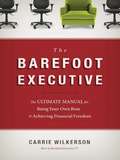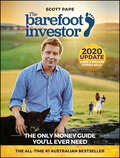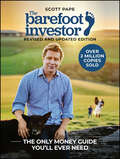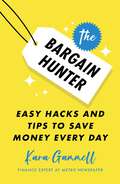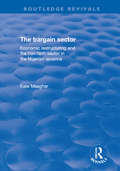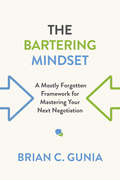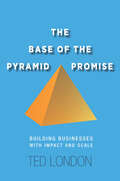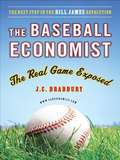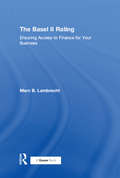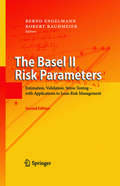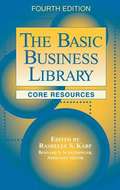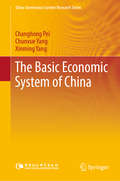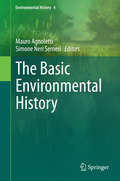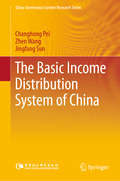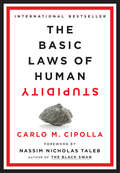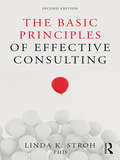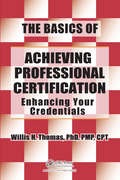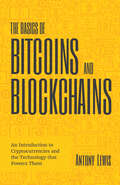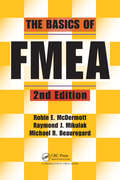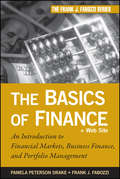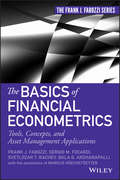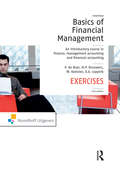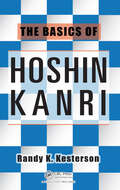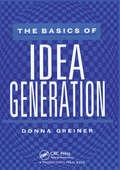- Table View
- List View
The Barefoot Executive: The Ultimate Guide for Being Your Own Boss and Achieving Financial Freedom
by Carrie WilkersonCarrie Wilkerson offers the opportunity to live life on your terms. Want to start your workday with e-mail and coffee on the back patio? Want the flexibility of joining your fourth grader on an all-day field trip? Are you ready to take that vacation you've been planning for years? Then you have a choice to make, and The Barefoot Executive will help jump-start your transition. You'll learn: Your "why." The most important question. Why do you want to work for yourself? What type of business best suits your experience and talents. How to stay focused on your goal and avoid distractions. Where to find the support that will accelerate your success. How to link your business to the right market. Whether it's a service, a product, or your insight or expertise, you already have the raw materials necessary to transform your life. Carrie will walk you through the process of building the business you need to achieve the life you want. Her guidance is practical. No philosophical silliness, no theoretical abstractions- just concrete action steps alongside insights from fellow entrepreneurs, interactive exercises, and links to Carrie's online video coaching segments. It's the next best thing to working one-on-one with her. The Barefoot Executive will have you energized by the possibilities and embracing the extraordinary life that is well within your reach. DISCOVER what you already have to offer, how to use it to your advantage, and where to find the people who are eager to buy it. The Barefoot Executive will pull you over the hurdle of uncertainty and get you moving, planning, doing. What Others Are Saying: "Carrie Wilkerson has done a great job with this book, and she's personally helped me make tons of money with my business. I highly recommend this book!" - Chris Brogan, president, Human Business Works, and publisher of chrisbrogan.com "There has never been a better time to turn your passions into income. But just having an idea doesn't mean you're ready to order business cards just yet. Carrie Wilkerson's The Barefoot Executive walks you through the process of developing your idea, finding your audience, and setting yourself up for a lifetime of success doing the work you love for the hardest boss you'll ever have... yourself!" - Dave Ramsey, host of The Dave Ramsey Show and best-selling author of The Total Money Makeover "One of the best ways to achieve success is to learn from someone who has already done it. If you are looking to build a viable, sustainable, and lucrative business from home- or anywhere else- Carrie Wilkerson is your example, and her new book will show you the way." - Tim Sanders, author of Today We Are Rich and former CSO at Yahoo! "A lot of books can fire up an entrepreneur. But a lot of those books leave readers high and dry when it comes to practical application. Enthusiasm isn't enough. You need a plan and the tools to build with. Carrie Wilkerson's guidance provides just that. Combine that with her enthusiasm, warmth, and core values, and you have someone very real to learn from. As my dad says, 'a great book needs to cover the Why and the How.' This is a great book. I know that when Carrie advises Ziglar, Inc. on marketing ideas, we get results." - Tom Ziglar, CEO and proud son of Zig Ziglar "If you're dreaming of building a business on your terms, then you'll absolutely love Carrie Wilkerson." - Tory Johnson, CEO, Women For Hire and New York Times best-selling author
The Barefoot Investor: The Only Money Guide You'll Ever Need
by Scott PapeThis is the only money guide you'll ever need That's a bold claim, given there are already thousands of finance books on the shelves. So what makes this one different? Well, you won't be overwhelmed with a bunch of 'tips' ... or a strict budget (that you won't follow). You'll get a step-by-step formula: open this account, then do this; call this person, and say this; invest money here, and not there. All with a glass of wine in your hand. This book will show you how to create an entire financial plan that is so simple you can sketch it on the back of a serviette ... and you'll be able to manage your money in 10 minutes a week. You'll also get the skinny on: Saving up a six-figure house deposit in 20 months Doubling your income using the 'Trapeze Strategy' Saving $78,173 on your mortgage and wiping out 7 years of payments Finding a financial advisor who won't rip you off Handing your kids (or grandkids) a $140,000 cheque on their 21st birthday Why you don't need $1 million to retire ... with the 'Donald Bradman Retirement Strategy' Sound too good to be true? It's not. This book is full of stories from everyday Aussies -- single people, young families, empty nesters, retirees -- who have applied the simple steps in this book and achieved amazing, life-changing results. And you're next.
The Barefoot Investor: The Only Money Guide You'll Ever Need
by Scott Pape**This Classic Edition has been updated for 2022 and beyond** THE ALL-TIME #1 AUSTRALIAN BESTSELLER This is the only money guide you’ll ever need. That’s a bold claim, given there are thousands of finance books on the shelves. Yet there’s a reason this book is in one in every 20 Australian homes. You’ll find out how to create an entire financial plan that is so simple you can sketch it on the back of a serviette … and you’ll be able to manage your money in 10 minutes a week. The Barefoot Steps stand the test of time. In this classic edition, you’ll get the skinny on: Saving up a six-figure house deposit in 20 months Doubling your income using the ‘Trapeze Strategy’ Saving $77641 on your mortgage and wiping out almost 7 years of payments Handing your kids (or grandkids) a $140000 cheque on their 21st birthday Why you don’t need $1 million to retire …with the ‘Donald Bradman Retirement Strategy’ Sound too good to be true? It’s not. This book is full of stories from everyday Aussies—single people, young families, empty nesters, retirees—who have applied the Barefoot Steps, freed themselves from crippling debt and achieved amazing, life-changing results.And you’re next.
The Bargain Hunter: Easy Hacks and Tips to Save Money Every Day
by Kara GammellIf it feels like your money doesn't go as far as it did before, you're right. The good news is that you can do something about it.Whether it's reducing your food waste to save on your supermarket spending, getting more miles to the gallon on the road or beating retailers at their best tricks for getting you to spend more, there are thousands of ways to stretch your money - you just need to know where to look. In this book, finance expert Kara Gammell has divided the contents by topic so you can start in the areas of your life where you think you could make the biggest savings. You'll find tips for entertaining the kids on a shoestring, money-saving hacks on booking your next summer break and many more . . . From laundry tips to multi-tasking kitchen tools, ingenious travel advice to getting the best out of customer service, the author dispenses no-nonsense advice that is incredibly easy to fit into your life, saving you much-needed cash along the way. Also touching on the bigger money questions like how and where to invest, which cashback schemes are the best and how to run a household in the most efficient and cost-effective way, this book will show you how.When life feels out of control, taking these little steps each day can help you feel like you are back in the driver's seat. You'll be surprised at how soon your savings can add up.
The Bargain Sector (Routledge Revivals)
by Kate MeagherThis title was first published in 2001: Does the non-farm sector offer new hope for rural Africa? In the face of economic crisis and restructuring across Africa, small-scale enterprise has come to play a central role in rural livelihood and accumulation strategies. This apparent dynamism has attracted favourable attention from development thinkers and policy-makers, who have identified non-farm enterprise as a new low-cost agent of rural development. The research in this book challenges the growing consensus on the developmental potential of the non-farm sector. On the basis of recent fieldwork, the author argues that the prospects for non-farm led growth have been seriously undermined by the crippling pressures of structural adjustment, agricultural instability and rural as well as interregional inequality. Detailed village case-studies from the populous and highly commercialized grain surplus region of the Nigerian savanna leads the reader to investigate the link between local economic and social realities, and the wider regional, national and global processes that form the development of the non-farm sector in Africa. Far from offering a bargain solution, the author demonstrates that significant investment in agriculture and entrepreneurial development will be needed to create an enabling environment for non-farm growth.
The Bartering Mindset: A Mostly-Forgotten Framework for Mastering Your Next Negotiation (G - Reference, Information and Interdisciplinary Subjects)
by Brian GuniaEver wonder why negotiating is so hard—why many of us don’t get the critical raise, can’t convince the teenager to get home on time, and never leave the car dealer feeling very good? According to The Bartering Mindset, the answer lies all around us—in our many daily monetary transactions. In particular, the book suggests that our daily exposure to money leads us to use think about negotiations as monetary transactions (adopt a "monetary mindset"), which inevitably prompts us to make counterproductive assumptions about negotiation and thus negotiate badly. So is everyone in a monetary economy fated to fail? Luckily not, since money is far from the only metaphor we can use for negotiations. The Bartering Mindset argues that by thinking about negotiations as bartering trades instead (adopting the "bartering mindset"), we can all learn to negotiate better and more productively. And it trains you to do just that through a straightforward, five-step process. Ultimately, The Bartering Mindset reminds you of a "mostly forgotten" mindset that will make even the most challenging, money-focused negotiations negotiable!
The Base of the Pyramid Promise
by Ted LondonAs economic growth slows in the developed world, the base of the pyramid (BoP) represents perhaps the last great, untapped market. Of the world's 7 billion inhabitants, around 4 billion live in low-income markets in the developing world. These 4 billion people deserve--and, increasingly, are demanding--better lives. At the same time, the business community seeks new opportunities for growth, and the development community is striving to increase its impact. With these forces converging, the potential for mutual value creation is tremendous. This book provides a roadmap for realizing that potential. Drawing on over 25 years of experience across some eighty countries, Ted London offers concrete guidelines for how to build better enterprises while simultaneously alleviating poverty. He outlines three key components that must be integrated to achieve results: the lived experiences of enterprises to date--both successes and failures; the development of an ecosystem that is conducive to market creation; and the voices of the poor, so that entrants can truly understand what poverty alleviation is about. London provides aspiring market leaders and their stakeholders with the tools and techniques needed to succeed in the unique, opportunity-rich BoP.
The Baseball ECONOMIST
by Bradbury J. C.Freakonomics meets Moneyball in this provocative exposé of baseball?s most fiercely debated controversies and some of its oldest, most dearly held myths Providing far more than a mere collection of numbers, economics professor and popular blogger J. C. Bradbury, shines the light of his economic thinking on baseball, exposing the power of tradeoffs, competition, and incentives. Utilizing his own ?sabernomic? approach, Bradbury dissects baseball topics such as: ? Did steroids have nothing to do with the recent homerun records? Incredibly, Bradbury?s research reveals steroids probably had little impact. ? Which players are ridiculously overvalued? Bradbury lists all players by team with their revenue value to the team listed in dollars?including a dishonor role of those players with negative values?updated in paperback to include the 2007 season. ? Does it help to lobby for balls and strikes? Statistics alone aren?t enough anymore. This is a refreshing, lucid, and powerful read for fans, fantasy buffs, and players?as well as coaches at all levels?who want to know what is really happening on the field. .
The Basel II Rating: Ensuring Access to Finance for Your Business
by Marc B. LambrechtIf you are seeking access to equity or finance from a bank or bank-related institution, your company will need a Basel II rating. How does the Basel II Rating differ from previous credit ratings? What specific information will your bankers require for the rating? What can you do to ensure the most favourable outcome? Unfortunately there is no mathematical or scientific solution to these questions. Approval of your request will largely depend on your ability to provide not simply the relevant information, but a tactically effective line of argument. If you under-represent your project, even if it does not fail the rating test outright, it is likely to get it assigned to a grade below its merit. The penalty is reflected in the conditions of the desired facility, especially, the rate of interest. Marc B. Lambrecht's The Basel II Rating shows you what information to assemble and exactly how to make your case in order to maximise your rating results. His book will help you argue the success potential of your business; accurately define the financial basis on which that success can be realised; and present your credentials convincingly. Follow the framework, use the advice and the techniques he suggests and you will make a convincing case for your business and the value and risk of the project for which you are seeking finance. This book can help you ensure continued access to business finance and equity on the best possible commercial terms.
The Basel II Risk Parameters: Estimation, Validation, Stress Testing - with Applications to Loan Risk Management
by Robert Rauhmeier Bernd EngelmannThe estimation and the validation of the Basel II risk parameters PD (default probability), LGD (loss given fault), and EAD (exposure at default) is an important problem in banking practice. These parameters are used on the one hand as inputs to credit portfolio models and in loan pricing frameworks, on the other to compute regulatory capital according to the new Basel rules. This book covers the state-of-the-art in designing and validating rating systems and default probability estimations. Furthermore, it presents techniques to estimate LGD and EAD and includes a chapter on stress testing of the Basel II risk parameters. The second edition is extended by three chapters explaining how the Basel II risk parameters can be used for building a framework for risk-adjusted pricing and risk management of loans.
The Basic Business Library: Core Resources (4th Edition)
by Bernard S. Schlessinger Rashelle S. KarpThe entries in this comprehensive reference offer substantial paragraphs on each work that detail its authority and scope, and provide a critical evaluation. For each title a price and website of the publisher is provided. Following the list of business reference sources are 10 essays on the sources and other services, including business periodicals, investment sources, collection development, organization of business libraries, and online resources. Karp teaches library science at Clarion U. of Pennsylvania; Schlessinger is emeritus in information studies at Texas Woman's U. in Denton. Annotation (c)2003 Book News, Inc., Portland, OR (booknews.com)
The Basic Economic System of China (China Governance System Research Series)
by Changhong Pei Chunxue Yang Xinming YangThis book uses facts and data to prove that socialist public sectors are still in a predominant position in China. Based on previous research and studies, a set of methods for measuring the structure of public or non-public owned economy is offered in this book. As is remarked by the authors, China’s basic economic system, namely the system with the public sector remaining dominant and diverse sectors of the economy developing side by side, represents an efficient approach towards mutual benefit, common prosperity and peaceful co-existence.
The Basic Environmental History
by Mauro Agnoletti Simone Neri SerneriThis book is an introductory instrument to the main themes of environmental history, illustrating its development over time, methodological implications, results achieved and those still under discussion. But the overriding aspiration is to show that the doubts, methods and knowledge elaborated by environmental history have a heuristic value that is far from negligible precisely in its attitude to the most consolidated major historiography. For this reason, this book gives an overview of environmental history as it is an essential component of the basic knowledge of global history. At the same time, it introduces specific aspects which are useful both for anyone wanting to deepen his/her studies of environmental historiography and for those interested in one of the many disciplinary areas - from rural history to urban history, from the history of technology to the history of public health, etc. with which environmental history develops a dialogue.
The Basic Income Distribution System of China (China Governance System Research Series)
by Changhong Pei Zhen Wang Jingfang SunThis book aims to explain and explore the distribution mechanism adopted by China, which prioritizes distribution according to performance while taking factors of production into consideration. This mechanism is designed in the context of current market-oriented economy, but it also leads to problems such as the widening income gap among the citizens. Besides serving for economic growth, the authors proposed balancing the interests through policies among different groups as one of the key role for distribution system, which may slow down or even stop the trend of widening income gap. And the authors also provided possible measures for this purpose.
The Basic Laws of Human Stupidity: The International Bestseller
by Carlo M. Cipolla"A masterly book" —Nassim Nicholas Taleb, author of The Black Swan "A classic" —Simon Kuper, Financial Times An economist explains five laws that confirm our worst fears: stupid people can and do rule the worldThroughout history, a powerful force has hindered the growth of human welfare and happiness. It is more powerful than the Mafia or the military. It has global catastrophic effects and can be found anywhere from the world's most powerful boardrooms to your local bar. It is human stupidity. Carlo M. Cipolla, noted professor of economic history at the UC Berkeley, created this vitally important book in order to detect and neutralize its threat. Both hilarious and dead serious, it will leave you better equipped to confront political realities, unreasonable colleagues, or your next dinner with your in-laws. The Laws: 1. Everyone underestimates the number of stupid individuals among us. 2. The probability that a certain person is stupid is independent of any other characteristic of that person. 3. A stupid person is a person who causes losses to another person while deriving no gain and even possibly incurring losses themselves. 4. Non-stupid people always underestimate the damaging power of stupid individuals. 5. A stupid person is the most dangerous type of person.
The Basic Minimum
by Dale DorseyA common presupposition in contemporary moral and political philosophy is that individuals should be provided with some basic threshold of goods, capabilities, or well-being. But if there is such a basic minimum, how should this be understood? Dale Dorsey offers an underexplored answer: that the basic minimum should be characterized not as the achievement of a set of capabilities, or as access to some specified bundle of resources, but as the maintenance of a minimal threshold of human welfare. In addition, Dorsey argues that though political institutions should be committed to the promotion of this minimal threshold, we should reject approaches that seek to cast the basic minimum as a human right. His book will be important for all who are interested in theories of political morality.
The Basic Principles of Effective Consulting
by Linda K. StrohConsultants are called upon more and more to help implement needed organizational changes, fill gaps in workforce capabilities, and solve significant business problems. As the demand for consultants increases, it is critical that practitioners differentiate themselves and understand how they can be most successful, for themselves and their clients. The Basic Principles of Effective Consulting details what effective consultants do and provides a step by step process of just how they do it. The Second Edition of The Basic Principles of Effective Consulting is fully updated with real-life cases. End-of-chapter summaries foster both mastery and engagement, as well as providing a quick reference throughout a consultant’s career. In addition, each chapter includes a section "From the experts" written by successful consultants and users of consultants’ services. These experts share ideas and tips about their own consulting experiences that relate to chapter material. The book is written for entry level and seasoned consultants, project managers, staff advisors, and anyone who wants to learn (or be reminded of) the basic principles of effective consulting. The book is well suited as an excellent textbook for college courses on consulting, organizational training, and a lifetime go-to consultant’s resource.
The Basics of Achieving Professional Certification: Enhancing Your Credentials
by Willis H. ThomasProfessional certification has become a very popular topic and a significant number of individuals are making it a priority. Some people are torn on whether or not to obtain a certification to bolster their career. Others see the advantage of diversifying their professional portfolio and pursuing popular certifications in the areas of Project Management, Information Technology, Quality, or Human Resources. The Basics of Achieving Professional Certification: Enhancing Your Credentials provides clear-cut guidance on how to select a certification that is right for you and how you can continue to build your credentials in support of personal and professional goals. This easy-to-use guide can help anyone looking to achieve professional certification make informed decisions about the many options available. It can also help avoid the pitfalls of making the wrong choice as a result of being incorrectly informed. Examining the range of professional certifications offered by associations and organizations, it explains how to select the right professional certification and outlines best practices for completing the certification process. The book includes a CD that represents more than a year of development between resources in the U.S. and Europe. Packed with tools, it supplies permanent access to a suite of helpful training and development software, including:Library management system to track training material, books, and related items (created in MS Access)Learning management system to ensure training compliance (created in MS Access)A number of project management resources, including a comprehensive exam preparation programRoyalty free multimedia resources to add pizzazz to your e-learning programsForms, templates, and checklists to support training administrationTool
The Basics of Bitcoins and Blockchains: An Introduction to Cryptocurrencies and the Technology that Powers Them
by Antony LewisDiscover the Surprising History of Ordinary Things"Emily magically weaves a vibrant history of simple everyday objects we often take for granted. The Story Behind will surprise and delight..." ─Deana Marie, Creator & Host of the Twisted Philly podcast#1 Best Seller in Trivia & Fun Facts, Art History, Design History & Criticism, Reference, Decorative Arts & Design, and History of TechnologyLearn the fascinating history and trivia you never knew about things we use daily, from the host of The Story Behind podcast.Everyday objects and major events in history. Every single thing that surrounds us has a story behind it. Many of us learn the history of humans and the major inventions that shaped our world. But what you may not have learned is the history of objects we surround ourselves with every day. You might not even know how the major events in history (World Wars, ancient civilizations, revolutions, etc.) influenced the inventions of things we use today.The history and science behind the ordinary. From the creator of The Story Behind podcast comes one of the coolest coffee table books ever written. The Story Behind provides insight into everyday objects we don’t think much about as we use them. Topics covered in Emily’s podcast are examined in more detail along with new fascinating topics. Learn how lollipops got started in Ancient Egypt, how podcasts were invented, and why Comic Sans was created. Learn the torture device origins of certain exercise equipment and the espionage beginnings of certain musical instruments. Ordinary things from science to art, food to sports, customs to fashion, and more are explored.Inside:Learn obscure history and fun facts and change the way you see the worldDiscover how major historic events still affect us todayBecome a formidable trivia masterIf you have enjoyed books such as Now I Know, What If?, Ever Wonder Why?, The Greatest Stories Never Told, or Atlas Obscura; you will be entertained by The Story Behind.
The Basics of FMEA
by Raymond J. Mikulak Robin McDermott Michael BeauregardDemonstrates How To Perform FMEAs Step-by-StepOriginally designed to address safety concerns, Failure Mode and Effect Analysis (FMEA) is now used throughout the industry to prevent a wide range of process and product problems. Useful in both product design and manufacturing, FMEA can identify improvements early when product and process changes are
The Basics of Finance
by Pamela Frank J. Fabozzi Peterson DrakeAn introductory guide to the world of finance The Basics of Finance is an accessible book for those who want to gain a better understanding of this field, but lack a strong business background. It covers essential concepts, tools, methods, and strategies in finance without delving too far into theory. Written by the experienced author team of Frank Fabozzi and Pamela Peterson Drake, this reliable resource discusses everything from financial instruments and markets to portfolio management techniques, understanding and analyzing financial statements, and different types of corporate financial strategy, planning, and policy. Explores, in a basic way, topics such as cash flow analysis, asset valuation, capital budgeting, and derivatives Provides a solid foundation in the field of finance, which you can quickly build upon Explains concepts in various areas of finance without getting too complicated The Basics of Finance offers essential guidance on financial markets and institutions, corporate finance, portfolio management, risk management, and much more. If you're looking to learn more about finance, this is the best place to start.
The Basics of Financial Econometrics: Tools, Concepts, and Asset Management Applications (Frank J. Fabozzi Series)
by Svetlozar T. Rachev Frank J. Fabozzi Sergio M. Focardi Bala G. ArshanapalliAn accessible guide to the growing field of financial econometrics As finance and financial products have become more complex, financial econometrics has emerged as a fast-growing field and necessary foundation for anyone involved in quantitative finance. The techniques of financial econometrics facilitate the development and management of new financial instruments by providing models for pricing and risk assessment. In short, financial econometrics is an indispensable component to modern finance. The Basics of Financial Econometrics covers the commonly used techniques in the field without using unnecessary mathematical/statistical analysis. It focuses on foundational ideas and how they are applied. Topics covered include: regression models, factor analysis, volatility estimations, and time series techniques. Covers the basics of financial econometrics—an important topic in quantitative finance Contains several chapters on topics typically not covered even in basic books on econometrics such as model selection, model risk, and mitigating model risk Geared towards both practitioners and finance students who need to understand this dynamic discipline, but may not have advanced mathematical training, this book is a valuable resource on a topic of growing importance.
The Basics of Financial Management: An introductory course in finance, management accounting and financial accounting
by Peter de Boer Rien Brouwers Wim KoetzierThis basic book is to familiarize students in (international) English-language programmes with the basics in the fields of finance, finance management and accounting. No prior knowledge of business economics is required. This book is user-friendly, accessible, and yet comprehensive in its approach. It takes an in-depth, integrated look at the principles of management accounting, financial accounting and finance. Examples and case studies from newspapers and professional journals encourage the practical application of the material. Study questions reinforce and test the student's understanding of the key concepts. A glossary of key terms is included at the end of each chapter. The book also contains multiple choice questions and other assignments designed to stimulate thinking about the topics that are discussed. Further self-test materials are available at www.basicsfinancialmanagement.noordhoff.nl including interactive multiple choice questions, exercises, cases and teachers manual.
The Basics of Hoshin Kanri
by Randy K. KestersonThe problem with most Hoshin Kanri books is that they describe a complex methodology that is overwhelming to most leaders and their organizations. The need to essentially change the culture of the entire organization to make Hoshin work isn‘t practical for most companies when first starting out.The Basics of Hoshin Kanri uses an easy-to-follow stor
The Basics of Idea Generation
by Donna GreinerContinuous generation and implementation of ideas is critical to creating an environment that helps foster the development of improvement techniques. The Basics of Idea Generation provides a cost-effective method that can help inspire employees to consistently identify and implement new ideas, using a proven five-step process. The process starts by creating an opportunity statement. From there the method then has one collect raw materials, before holding an idea workout, and then evaluating the idea. Implementation is the final step. The author also explains the 20 tools that help complete each step, along with solutions to overcoming the barriers to creativity.
